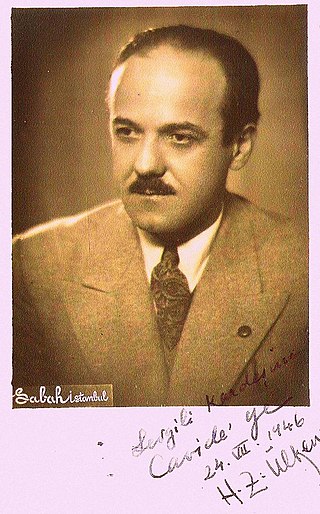Related Research Articles

Mehmet Fuat Köprülü, also known as Köprülüzade Mehmed Fuad, was a highly influential Turkish sociologist, Turkologist, scholar, Minister of Foreign Affairs and Deputy Prime Minister of the Republic of Turkey. A descendant of the prominent Köprülü family, Fuat Köprülü was a key figure in the intersection of scholarship and politics in early 20th century Turkey.
Prose of the Republic of Turkey covers the "Turkish Prose" beginning with 1911 with the national literature movement.

Ali Fuat Cebesoy was a Turkish military officer who served in the Ottoman Army and then in the Turkish army and politician.
There were a number of poetic trends in the poetry of Turkey in the early years of the Republic of Turkey. Authors such as Ahmed Hâşim and Yahyâ Kemâl Beyatlı (1884–1958) continued to write important formal verse whose language was, to a great extent, a continuation of the late Ottoman tradition. By far the majority of the poetry of the time, however, was in the tradition of the folk-inspired "syllabist" movement, which had emerged from the National Literature movement and which tended to express patriotic themes couched in the syllabic meter associated with Turkish folk poetry.
Ahmet Kutsi Tecer was a Turkish poet and politician.

Halkevleri is a Turkish community enlightenment project. They were founded in 1932 and entirely abolished in 1951.

Mehmet Nuri Conker was a Turkish politician and an officer of the Ottoman Army and the Turkish Army.
Pertev Naili Boratav, born Mustafa Pertev was a Turkish folklorist and researcher of folk literature. He has been characterized as 'the founding father of Turkish folkloristics during the Republic'.

Hayat was an Ottoman Turkish language weekly magazine published in Ankara and Istanbul between 1926 and 1929 in a total of 146 issues. For the first 75 issues Mehmet Emin Erişirgil was the editor-in-chief, then Nâfî Atuf Kansu and Faruk Nafız Çamlıbel assumed the office. The magazine described itself as "literary opinion magazine".
Türk Yurdu is a monthly Turkish magazine that was first published on the 30 November 1911. It was an important magazine propagating Pan-Turkism. It was founded by Yusuf Akçura, Ahmet Ağaoğlu, Ali Hüseynzade. Ziya Gökalp said: "all Turkists... met and worked together in the Türk Yurdu and Türk Ocağı ambiance." The magazine was one of the early Turkish periodicals which featured articles on folklore.
Adalet Cimcoz was a Turkish voice actress, art curator, critic, translator and gossip columnist. She dubbed many film stars over a period of more than thirty years. She also opened and curated Turkey's first and only woman-owned private art gallery for exhibitions of painting, sculpture, mosaic, ceramics, photography, patterns, and folk art. She critiqued literature, art, and theatre for twenty years. She translated a number of classical works of European literature from German to Turkish. She was also a gossip columnist under the pen name "Fitne Fücur" ".

İsmail Hakkı Baltacıoğlu was a Turkish academic, journalist and intellectual. Until 1933 he was a faculty member at Darulfunün, later Istanbul University, of which he was the first rector following the establishment of the Republic of Turkey. Following his dismissal from the university in 1933 he published and edited a cultural magazine entitled Yeni Adam and served as a deputy at the Turkish Parliament from Republican People's Party for two terms from 1942 to 1950. He is known as the father of the educational thought and practice of the Republic of Turkey.

Hilmi Ziya Ülken (1901–1974) was a Turkish scholar and writer who had an influential role in the development of sociological and philosophical views in Turkey. In addition to his scientific work, he produced literary work, including poems.
İctihad was a cultural and political magazine which was started and published by Abdullah Cevdet, an Ottoman intellectual. It was established in Geneva, Switzerland, in 1904 and then appeared in Cairo. The magazine was headquartered in Istanbul between 1911 and 1932.
References
- 1 2 3 4 5 6 7 Betül Karcı (2 March 2021). "Ülkü Dergisi (Ülkü Magazine)". Atatürk Encyclopedia (in Turkish).
- 1 2 3 4 5 Volkan Kılınç (2017). Disciplining' Turkish people through the people's houses: A discursive reading of the Ülkü magazine (1933-1950) (MA thesis). Istanbul Şehir University. pp. 83–85.
- 1 2 Mustafa Tuna (2018). "The Missing Turkish Revolution: Comparing Village-level Change and. Continuity in Republic Turkey and Soviet Central Asia, 1920-50". International Journal of Middle East Studies . 50 (1): 29. doi:10.1017/S0020743817000927. S2CID 165497527.
- 1 2 Nazan Çiçek (2016). "The Interplay between Modernization and the Reconstruction of Childhood: Romantic Interpretations of the Child in Early Republican Era Popular Magazines, 1924–1950". In Benjamin C. Fortna (ed.). Childhood in the Late Ottoman Empire and After. Vol. 59. Leiden; Boston: Brill. pp. 25–26, 31. doi:10.1163/9789004305809_003. ISBN 978-90-04-30580-9.
- 1 2 3 4 5 Alim Kahraman (2012). "Ülkü". Islam Encyclopedia (in Turkish). Vol. 42). pp. 293–294.
- 1 2 3 Ertan Aydın (2003). The peculiarities of Turkish revolutionary ideology in the 1930s: the Ülkü version of Kemalism, 1933-1936 (PhD thesis). Bilkent University. pp. 1–2. hdl:11693/29409.
- ↑ Paul J. Magnarella; Orhan Türkdoğan (June 1976). "The Development of Turkish Social Anthropology [and Comments and Reply]". Current Anthropology . 17 (2): 266. doi:10.1086/201715. S2CID 147258531.
- 1 2 Erdem Sönmez (2021). "A past to be forgotten? Writing Ottoman history in early republican Turkey". British Journal of Middle Eastern Studies . 48 (4): 754, 760. doi:10.1080/13530194.2020.1714428. S2CID 212765576.
- ↑ Mustafa Sever (2018). "The Kocyigit Koroglu Play of Ahmet Kutsi Tecer" (PDF). Journal of World of Turks. 10 (3): 7.
- ↑ Kemal H. Karpat (1960). "Social Themes in Contemporary Turkish Literature: Part I". The Middle East Journal . 14 (1): 42. JSTOR 4323199.
- ↑ Serdar Öztürk (2008). "The Struggle over Turkish Village Coffeehouses (1923–45)". Middle Eastern Studies . 44 (3): 442. doi:10.1080/00263200802021590. S2CID 143955939.